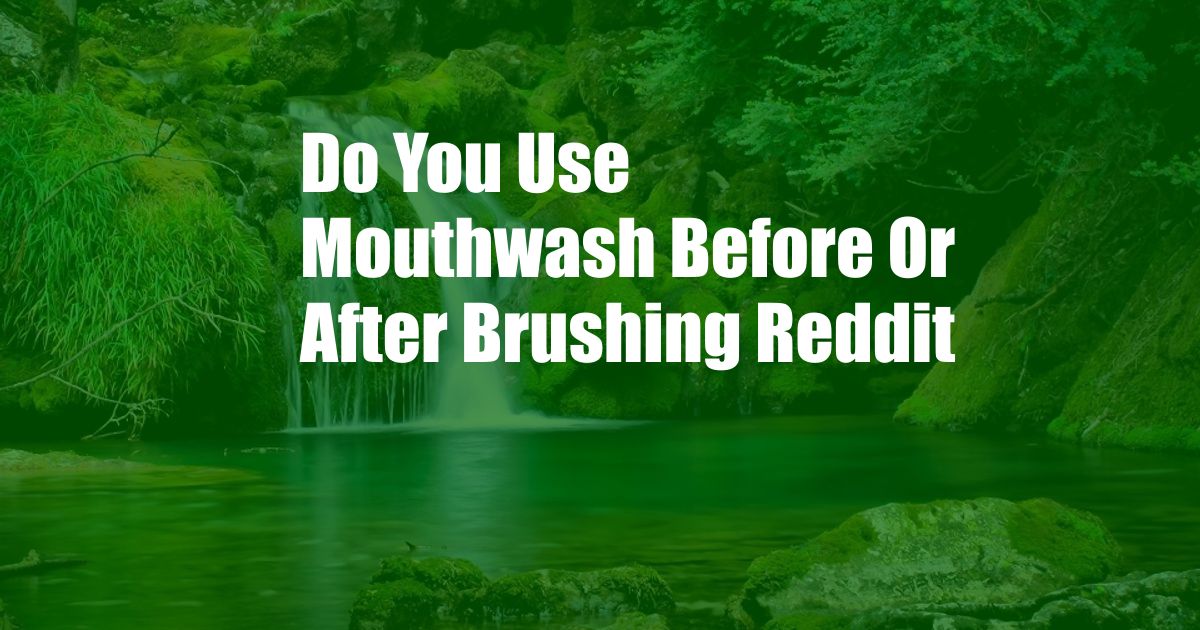
Do You Use Mouthwash Before or After Brushing? Reddit Weighs In
The eternal debate rages on: should you use mouthwash before or after brushing your teeth? I can still hear my dentist’s voice, echoing in the recesses of my mind, “Brush, floss, rinse, repeat.” But is this the correct order? Reddit has some strong opinions on the matter, so let’s dive into the wisdom of the crowds.
Mouthwash is designed to kill bacteria and freshen breath. It contains ingredients like alcohol, fluoride, and essential oils that can help to reduce plaque and gingivitis. But if you use mouthwash before brushing, you may be washing away the fluoride from your toothpaste, which is essential for strengthening teeth and preventing cavities.
Brushing Before Mouthwash: The Case for Clean Teeth
Advocates for brushing before mouthwash argue that it allows the toothpaste to do its job more effectively. Toothpaste contains detergents that help to break up plaque and food particles, and fluoride that strengthens teeth. If you use mouthwash before brushing, you may be rinsing away these beneficial ingredients before they have a chance to work.
Another argument for brushing before mouthwash is that it helps to remove the bacteria that cause bad breath. When you brush your teeth, you remove the food particles and bacteria that can build up on your teeth and tongue. If you use mouthwash after brushing, you may be rinsing away some of these bacteria, but you will also be rinsing away the fluoride from your toothpaste.
Mouthwash Before Brushing: The Case for Fresh Breath
Those who prefer to use mouthwash before brushing argue that it helps to freshen breath more effectively. Mouthwash contains ingredients like alcohol and essential oils that can kill bacteria and leave your breath smelling minty fresh. If you use mouthwash after brushing, you may be rinsing away some of these beneficial ingredients.
Another argument for using mouthwash before brushing is that it can help to reduce plaque and gingivitis. Plaque is a sticky film of bacteria that can build up on your teeth and cause cavities and gum disease. Gingivitis is a mild form of gum disease that can cause your gums to become red, swollen, and bleeding. Mouthwash can help to kill the bacteria that cause plaque and gingivitis, and it can also help to reduce inflammation.
Expert Advice
So, which way is the right way to use mouthwash? Ultimately, the best way to use mouthwash is the way that works best for you. If you are concerned about cavities, you may want to brush your teeth before using mouthwash. If you are more concerned about bad breath, you may want to use mouthwash before brushing.
Here are some tips from dentists and oral hygienists:
- Use a mouthwash that contains fluoride. Fluoride helps to strengthen teeth and prevent cavities.
- Use a mouthwash that is alcohol-free. Alcohol can dry out your mouth and irritate your gums.
- Don’t rinse your mouth with water after using mouthwash. This will rinse away the beneficial ingredients.
FAQ
Q: What is the best time to use mouthwash?
A: The best time to use mouthwash is after brushing and flossing your teeth.
Q: How often should I use mouthwash?
A: You should use mouthwash twice a day, once in the morning and once at night.
Q: Can I use mouthwash instead of brushing my teeth?
A: No, you should not use mouthwash instead of brushing your teeth. Mouthwash is not a substitute for brushing and flossing.
Q: What are the benefits of using mouthwash?
A: Mouthwash can help to kill bacteria, freshen breath, and reduce plaque and gingivitis.
Q: Are there any side effects to using mouthwash?
A: Some people may experience side effects from using mouthwash, such as dry mouth, irritation, and staining of the teeth.
Conclusion
The debate over whether to use mouthwash before or after brushing is likely to continue for years to come. Ultimately, the best way to use mouthwash is the way that works best for you. If you are concerned about cavities, you may want to brush your teeth before using mouthwash. If you are more concerned about bad breath, you may want to use mouthwash before brushing. Whichever way you choose, be sure to use mouthwash regularly as part of a good oral hygiene routine.
Do you have any questions about using mouthwash? Let me know in the comments below!